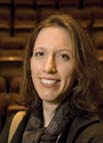Aurélie Thiele was enjoying a true leftbrain experience – a performance by the Dresden Philharmonic Orchestra at Lehigh’s Zoellner Arts Center in November 2004 – when her right brain kicked into overdrive.
Thiele, an assistant professor of industrial and systems engineering, saw more than a show that night; she also saw an optimization problem.
“My father’s family is from Dresden, Germany, so I knew about the orchestra’s quality and I had expected the show to be sold out,” recalls Thiele. “But it wasn’t, although it was well attended. That got me to wondering whether a show needs to sell out to be successful and whether prices have an impact on the Zoellner Arts Center.”
Thiele interviewed Zoellner’s staff and analyzed its data. She found that the arts center had a good pricing strategy, but that it could achieve greater customer satisfaction by developing more efficient procedures for seating patrons.
“Zoellner regularly brings top performers to the Lehigh Valley,” said Thiele. “We’re trying to help it become even more successful. We’re finalizing our software and hoping to use it for next season’s seating assignments.”
The software, which uses Visual Basic in Excel, tracks the attendance, subscription and giving records of Zoellner patrons. It uses a weighted system of assigning seats in an effort to increase customer satisfaction and, ultimately, customer involvement with the arts center. It also frees Zoellner’s staff from assigning seats by hand, thus allowing them to spend more time interacting with customers and signing up artists.
Thiele develops and analyzes mathematical models for dynamic optimization problems whose information is incomplete or imperfect – as is the case with the Zoellner Arts Center.
“I try to make models that match the level of information people have in real life,” she says. “My goal is to develop models that are easy to implement.”
In her research, Thiele addresses the lack of knowledge in the underlying sources of randomness that characterize many real-life applications. Operations management for retailers, for example, requires factoring variability of customer demand into inventory control and revenue management. Current algorithms and techniques assume a prespecified structure for these random variables (for example, a bell shape for demand), but obtaining actual information is difficult.
“We need models that do not rely on a probabilistic description of uncertainty, that perform well for a wide range of realizations of the random variables, and that, as a result, are better suited for industry purposes,” Thiele says. “Not all managers are familiar with probabilities and mathematical models. People are very reluctant to implement models they don’t understand.”
Championing the relevance of mathematics to everyday life is the theme – the leitmotif, you might say – of Thiele’s work.
“Much of my job is educating people about numbers, and helping them understand uncertainty,” she says.
Thiele has published her work in Operations Research, the IMA Journal of Management Mathematics, and the Journal of Revenue and Pricing Management, and she blogs about education, engineering, and business at engineered.typepad.com. Supporting her research are IBM and NSF. IBM recently gave Thiele a Faculty Award in Services Sciences Management and Engineering (SSME). SSME is a new interdisciplinary approach to designing and implementing complex systems that combines business, engineering, and human factors to reflect the global shift to a service economy.
“SSME involves human behavior, how your customers are going to react,” Thiele says. “Comprehensive, mathematical models have to take the customer into account. Our goal is to make computer models more relevant to people and more widely used.”

